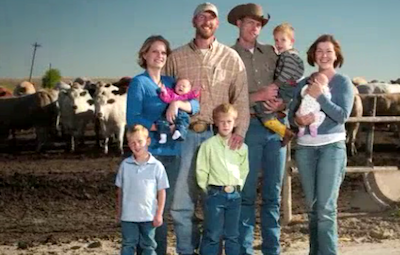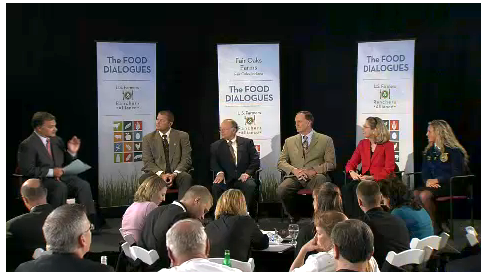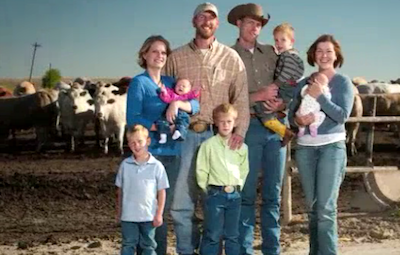 Photo: USFRAOn Thursday, Sept. 22, the U.S. Farmers & Ranchers Alliance, a new trade association made up of some of the biggest players in the food industry — including the National Cattlemen’s Beef Association, Dupont, and Monsanto — hosted what it called “Food Dialogues” in Washington D.C., New York City, U.C. Davis, and Fair Oaks, Ind.
Photo: USFRAOn Thursday, Sept. 22, the U.S. Farmers & Ranchers Alliance, a new trade association made up of some of the biggest players in the food industry — including the National Cattlemen’s Beef Association, Dupont, and Monsanto — hosted what it called “Food Dialogues” in Washington D.C., New York City, U.C. Davis, and Fair Oaks, Ind.
The USFRA describes the Food Dialogues, and its broader multimillion-dollar media campaign, as an effort to amplify the voice of farmers and ranchers and help consumers know more about “how their food is grown and raised.”
Sounds good, on first blush.
Most of us are in the dark when it comes to the story of our food. And, farmers and ranchers — the people working hard every day to bring us our food — are nearly invisible in mainstream media. But dig into the Alliance’s membership, and its impetus for forming, and you start to wonder whether it truly represents the voices of grassroots food producers or whether this well-funded media campaign is agribusinesses latest attempt to push back against well-documented and well-publicized concerns about the environmental and health consequences of industrial agriculture.
When I asked a rep from Ketchum — the public relations firm hired by the Alliance — what motivated these groups to come together, without skipping a beat, he answered: Food, Inc. and movies like it. “People see Food, Inc.,” he said, “And think everything in that movie is accurate.” But, he continued, the film only presents one side of the issue and USFRA members feel they didn’t “have a voice in it.” Now, as the Ketchum rep put it, USFRA wants to “clear the air” and “get a national dialogue, a conversation, going.”
There are two big holes in this argument: Robert Kenner, the director of Food, Inc. did try to get industry voices into the film. And, while USFRA members may not like it, Food, Inc. is an accurate, if unpleasant, account of our industrial, toxic food system.
When I mentioned that Kenner approached many food companies to get their perspective, and they refused to go on camera, the PR rep said: “I’ll be honest with you: this is a change with how they’ve done things in the past. They’re trying to open their doors up.”
While these industry players may be saying they want to “open their doors up,” it seems only on their terms. Certainly the Food Dialogues event gave a semblance of impartiality: Highly credentialed journalist Claire Shipman of Good Morning America moderated from a satellite location in D.C. and celebrity chef John Besh hosted the panel in New York City.
But the reality was an orchestrated framing of the message about “modern agricultural production” from the perspective of big business. In the staged kitchen set at the New York City, the questions from the “audience” included only one: a prearranged question from the head of the National Pork Board. In D.C., Jay Vroom, from the agrochemical trade association CropLife America, was handpicked to join in the “conversation” and lob a softball question to John Besh about chefs and portion control.
Earlier this year, a trade publication explained that this image campaign, and others like it, not only aims to counter Food, Inc.‘s “misconceptions” about food, but also to convert all those “Pollan-ated” minds. (Reading Michael Pollan is apparently unnerving to the food industry and it should be to the rest of the public, too.)
This media campaign, the industry publication continued, is also intended as a “preemptive strike” against “a long list of new regulations and restrictions coming out of the Environmental Protection Agency, the U.S. Department of Agriculture, and the Food & Drug Administration, ranging from tighter rules on pesticide applications to a potential ban of routine, preventative use of animal antibiotics.”
Take a look at the policy priorities of USFRA members and you’ll see exactly that: Most of its affiliates are hard at work, lobbying on Capitol Hill to weaken the very regulations that the consumers the USFRA itself surveyed say they care most about: Pesticides and antibiotics, for instance, as well as artificial hormones in animal production, and air and water pollution.
 One of four “Food Dialogues” broadcast live on the USFRA site last Thursday As one of its current policy priorities, the National Cattlemen’s Beef Association (NCBA), a USFRA board member and the marketing organization and trade association for the beef industry, is fighting for the Defending America’s Affordable Energy and Jobs Act. If passed, the Act would limit the EPA’s ability to regulate greenhouse gas emissions.
One of four “Food Dialogues” broadcast live on the USFRA site last Thursday As one of its current policy priorities, the National Cattlemen’s Beef Association (NCBA), a USFRA board member and the marketing organization and trade association for the beef industry, is fighting for the Defending America’s Affordable Energy and Jobs Act. If passed, the Act would limit the EPA’s ability to regulate greenhouse gas emissions.
Yet, as many in the environmental community have pointed out, the EPA’s regulation of carbon dioxide pollution is key to addressing global warming in the absence of strong climate policy. This USFRA member attack on climate legislation shouldn’t be surprising considering the Alliance is working with Frank Luntz, the political strategist who has helped foster climate change skepticism. In a strategy memo leaked to the media in the early 2000s, for instance, Luntz advised congressional Republicans that the best tactic to undermine public support for climate legislation is to cast doubt on the “scientific certainty” surrounding the issue.
To give you another sense of where USFRA membership stands, consider that the NCBA, along with other Alliance members, is actively fighting a policy that would reign in antibiotic abuse in livestock production. Called the Preservation of Antibiotics for Medical Treatment Act, and sponsored by Rep. Louise Slaughter (D-N.Y.), the Act, according to the Cattlemen’s Association, is unnecessary: The industry already uses antibiotics “judiciously” to prevent disease.
Slaughter and other backers of this policy stress that research shows most antibiotics in livestock production are not given for disease prevention, but delivered at “sub-therapeutic levels” to speed growth — and therefore increase profit. And, as experts at the Government Accountability Office reported earlier this month, the inaction of the USDA and FDA to regulate antibiotic use, especially in animal production, is a serious threat to public health. It was chillingly ironic that the study came out on the heels of another major recall of Cargill gro
und turkey linked to antibiotic-resistant Salmonella.
Lest you think the Cattlemen’s Association is out on its own on this fight, other USFRA affiliates that are vocal opponents of regulating antibiotics in livestock production include the Dairy Farmers of America, National Pork Producers Council, American Egg Board, U.S. Poultry & Egg Association.
Another USFRA affiliate and board member, the National Corn Growers Association, is also battling policies that would help us protect public health. In a May 2011 statement delivered to the House Committee on Agriculture and on Natural Resources, Rod Snyder, the Corn Grower’s Policy Director and chair of the Pesticide Policy Coalition, dismissed the use of the Endangered Species Act’s to control toxic pesticides, describing the policy as “dysfunctional.”
He called for the administration to “immediately suspend implementation” and continue with business-as-usual, regulating pesticides under the Federal Insecticide Fungicide Rodenticide Act (FIFRA). But stress the importance of using the Endangered Species Act, explaining that FIFRA is “notoriously weak” and “industry-friendly.” According to advocates, the pesticide lobby, including USFRA members like the Corn Growers, wants to keep regulation under FIFRA because they know how to “sidestep and subvert it.”
While I believe the majority of our nation’s ranchers and farmers are respectful stewards of the land with the public’s best interest at heart — they’re working hard to reduce their environmental impact and address pesticide, artificial hormone, and antibiotics overuse — the USFRA clearly is not representing them. Instead, a look at the Alliance affiliates reveals that it is made up of, and funded by, the biggest players in the food industry, including those who profit most from toxic agricultural chemicals, polluting farming and food processing practices, and concerning animal welfare policies. No wonder, then, that that limiting protections from toxic pesticides and pushing back against antibiotic regulation are just two of the current policy priorities of USFRA affiliates.
The USFRA is working hard to present itself as a voice of farmers and ranchers interested in a conversation with consumers. I’m all for open, honest conversation, but let’s not be duped by polished PR into thinking that’s what the Alliance and its inaugural Food Dialogues is intended to be.
This post originally ran on Civil Eats.



